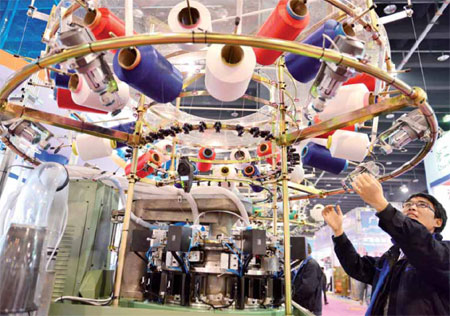New world opens for all investors
Updated: 2013-11-29 10:31
By Li Yang (China Daily Europe)
|
|||||||||||
Chinese government's latest financial reforms set to benefit businesses from all over the globe
China will introduce a new, fairer and more efficient administrative model for foreign investment, according to the Commerce Ministry.
The government will treat foreign and domestic investors equally in the admission and establishment stages of their investment projects, Commerce Minister Gao Hucheng said on Nov 25.
The reforms were officially proposed at the recently concluded Third Plenum of the Communist Party of China's 18th Central Committee in Beijing.
They will include pre-establishment national treatment and a negative list for foreign investors, which will tell them what sectors of the economy they cannot invest in. It will replace the current investment guidelines that tell them where they can invest.
"Foreign investors will enjoy equal treatment with their Chinese counterparts in the fields not on the negative list," Gao said.
China has been the biggest user of foreign funds among developing countries for the past 20 years. Despite the rising costs of labor and land, most foreign investors are still positive about China's investment climate.
"Chinese leaders have seen the need to streamline investment approval procedures and open up more fields to foreign investors, which will bring China new development opportunities and contribute to the sustainability of its economic growth," Greg Gilligan, chairman of the Beijing-based American Chamber of Commerce in China, told Xinhua News Agency.
Analysts believe the new model will bring about major changes to China's administration of foreign funds and further improve the country's investment environment.
Gao said the new administrative model, as officially proposed in the reform plan of the just-concluded Third Plenum, "responds to some foreign enterprises' expectations and will consolidate foreign investors' confidence about expanding investment and even moving their research and development centers and regional headquarters to China".
In the 5th China-US Strategic and Economic Dialogue in July, China agreed for the first time to regard pre-establishment national treatment and a negative list as the basis for negotiations in bilateral investment treaty talks with the United States.
The first regional negative list in China was released in late September in the Shanghai Pilot Free Trade Zone. Experts say the Shanghai negative list is a strong indicator of the contents of a national version, which will be drawn up by the Commerce Ministry and the National Development and Reform Commission.
At a news conference on Nov 25, Lian Weiliang, vice-minister of the commission, said a new version of the directory of investment projects requiring government approval will be released very soon.
This will further reduce the range of corporate investment needing review and approval from the commission and other government agencies.
Investment projects - except those affecting national security, eco-safety, exploitation of strategic resources, or of vital public interest - will be determined by enterprises in accordance with the law and without the need for government approval, according to the reform blueprint issued by the Central Committee of the CPC on Nov 15.
"We have abolished or transferred 44 items requiring administrative approval to local governments this year, and we are on the way to phasing out another batch of items," Lian said.
He said that for the smaller number of projects and items that still require central government approval, the commission is developing a review system that will make the procedure highly efficient.
"The negative list should be short, easy to follow," Ma Yu, a researcher with the Commerce Ministry, told Economic Information Daily.
"A series of foreign fund administrative reforms will follow. For example, the procedures for investment project application, assessment and approval should be abolished, according to the reform directions, and relevant rules and laws should be amended accordingly.
"The duties of the Commerce Ministry, the NDRC and the State Administration of Industry and Commerce should be adjusted to fit the new reformed system for dealing with foreign funds."
Yin Zonghua, director of the international division of the Commerce Ministry, echoed Ma's views at a media conference in the Shanghai FTZ in late September.
"The government will replace the current approval system with a filing system for foreign investment projects and foreign enterprises as well as for China's overseas investment," he said.
Gao said: "We will unify the rules and laws on foreign and domestic investments to keep the policies stable, transparent and predictable to ensure a unified, fair and transparent investment entry system."
As the reform plan of the Third Plenum indicates, Gao said the Chinese government will open up foreign investment in finance, education, culture and medical care, and lift entry barriers in the fields of architectural design, the care of babies and the elderly, accounting and auditing, commerce and trade, logistics, electronic commerce and other service sectors.
"Opening up these fields to foreign capital will be good for people's livelihoods and will optimize China's industrial structure," he said.
Moreover, due to the establishment of the Silk Road Economic Zone and the China-ASEAN free trade Area, China's border areas with Southeast Asia, Northeast Asia and Central Asia are expected to become new growth points for foreign investment in China.
Data from the Commerce Ministry show foreign investment in actual use in China hit $97 billion from January to October last year, rising by 5.77 percent year-on-year and growing for nine consecutive months. This occurred despite the negative influence of the phasing out of quantitative easing policies in most developed economies.
From 2000 to 2010, an aggregate of $261.7 billion was remitted out of China as net profits made by foreign enterprises. The amount increased by 30 percent annually, a much higher rate than the global average annual growth rate of 20 percent.
In return, China would like to steer more foreign capital to some much-needed areas, such as high-tech, innovation and research.
Gao vowed to further open up China's general manufacturing industries to foreign capital and to encourage foreign enterprises to build R&D centers and develop technology trade markets in China.
Since the Chinese government first encouraged foreign investment in 1986, its administrative system for foreign investment has become more market-oriented and less government-dominated.
The pre-establishment national treatment and negative list are the latest ambitious trial reforms, and are partly a result of regional trade integration and economic globalization, which have affected China since its entry into the World Trade Organization in 2001.
"The negative list is a key focus of the bilateral investment treaty negotiations between China and the United States, and China and the EU," said Chen Fengying, director of the Institute of World Economic Studies at the China Institutes of Contemporary International Relations.
"The government deserves praise for taking this brave step to synchronize its international dialogue agenda with its domestic reform plans."
All major economies should compete on an equal footing. The super-national treatment of foreign enterprises put Chinese companies at a disadvantage in the market and affected its healthy development.
Analysts pointed out that canceling the super-national treatment of foreign enterprises was designed to protect the more competent foreign firms by allowing them to benefit from a fairer market and a more developed tax system.
In China's reformed market, the prospects for foreign enterprises' profits remain brighter than the global average.
According to the EU Chamber of Commerce in China, 15 percent of European enterprises in the country lost money in 2012, a much lower proportion than the level from 2007 to 2010. About two-thirds of sampled European enterprises in China registered profit margins equal to or higher than the 2012 global average.
The American Chamber of Commerce in China's report showed 71 percent of sampled enterprises saw profits increase and 44 percent registered profit margins higher than the 2012 global average.
The Chinese government will also simplify the administration of outbound investments, replacing the current approval system with a filing system that will adapt quickly to China's development as a major international investor.
It is estimated China will invest nearly $100 billion abroad this year, up from about $84 billion last year and making it the third-largest investor after the US and Japan in 2012 and 2013.
"We encourage Chinese enterprises to set up research and development agencies abroad, absorb advanced production practices, establish overseas marketing networks, develop their own brands and improve their competency," Gao said.
He also added that the Chinese government will construct a service system offering risk advice, legal consulting and information for Chinese overseas investors. It will also protect their legal interests by signing bilateral investment protection agreements.
Reforming the foreign investment administration is also in line with the requirements for broader reform of government functions, which in the past was a controversial proposal that met strong resistance.
Analysts think the reforms will not only improve the performance of foreign funds but also government efficiency.
If there is a similar negative list for domestic investors, the government will greatly reduce the number of its approval reviews, says Wang Yiming, a macro-economy researcher with the NDRC. "This is a good way to limit government power and restrict its interference in the market."
When he vowed recently that the Chinese government would give equal treatment to domestic and foreign investments in China, Commerce Minister Gao said: "Simplifying administrative procedures for foreign funds shows that China will open up wider to the world. It reflects China's contribution to the world economy, given its economic and market size, as well as the world economy's influence on China's reforms."
liyang@chinadaily.com.cn
|
A staff member checks a high-speed knitting machine at the first session of China Yiwu International Manufacturing Equipment Expo during Nov 19-22, which attracted manufacturers from around the world. China will further open its general manufacturing industries to foreign capital and encourage foreign enterprises to build R&D centers and develop technology trade markets, experts say. Lyu Bin / for China Daily |
( China Daily European Weekly 11/29/2013 page14)
Today's Top News
Cameron to arrive with big delegation
China launches moon rover
Honor Cairo Declaration
34th high-speed railway starts
Testing time for China's tea growers
8 dead in police helicopter crash onto Glasgow pub
Xi stresses fight against HIV
Premier's trips bear fruit
Hot Topics
Lunar probe , China growth forecasts, Emission rules get tougher, China seen through 'colored lens', International board,
Editor's Picks

|

|

|

|

|

|





